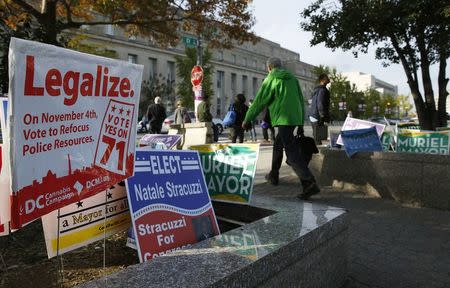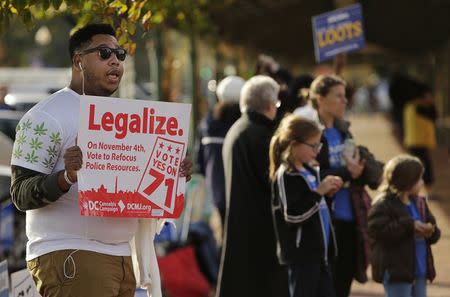D.C. has 'discussion' on legal pot on fear hearing illegal
By Ian Simpson WASHINGTON (Reuters) - A planned District of Columbia city council hearing on legal marijuana sales was reduced to a discussion on Monday because of fears the hearing could be illegal. The hearing was intended to get public comment on a bill that would make recreational marijuana legal in the U.S. capital and regulate sales like alcohol. District voters overwhelmingly approved a ballot initiative last year legalizing marijuana. But District Attorney General Karl Racine warned the council not to go ahead because Congress had used a spending bill last year to bar the city from spending any money to ease its marijuana laws, a spokesman for Racine said. The hearing by the city's finance, judiciary and business panels instead became a "roundtable discussion" to hear points of view, Business Committee Chairman Vincent Orange said. Council members and backers defended the bill as a way to assert Washington's independence from congressional meddling, generate tax revenue and end injustice stemming from prohibition of marijuana. "What I'm trying to do is trying to take a new approach to this old problem," Council member David Grosso said. The Marijuana Legalization and Regulation Act of 2015 would let the city join the states of Washington and Colorado in allowing the sale of marijuana for recreational use by adults. It sets out rules for the sale and taxing of marijuana, with the District's liquor board overseeing regulation. Testimony was largely in favor of regulated sales, with supporters calling for a lower tax rate to keep the price of legal pot competitive with black market product. Opponents criticized the law as opening young people up to drug use. Kimberly Hartke, with Parents Opposed to Pot, said the District would become a drug magnet for teenagers from neighboring Maryland and Virginia. Congress has oversight of the District, and a congressional review period for Initiative 71 runs out at the end of February. Council Chairman Phil Mendelson has said that by March the city would begin to treat Initiative 71 as law, which would in effect legalize possession without any way to buy pot legally. The city now has one of the lightest U.S. penalties for pot possession. Marijuana possession remains illegal under federal law, but the Obama administration's Justice Department has generally taken a hands-off approach in states where its sale is properly regulated. (Editing by Eric Walsh)



